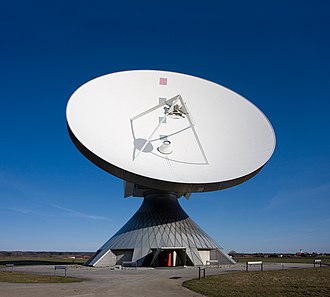
Back بوابة:اتصال عن بعد Arabic Portail:Télécommunications French Portale:Telematica Italian Portal:电信 Chinese
The Telecommunication Portal

Telecommunication, often used in its plural form, is the transmission of information with an immediacy comparable to face-to-face communication. As such, slow communications technologies like postal mail and pneumatic tubes are excluded from the definition. Many transmission media have been used for telecommunications throughout history, from smoke signals, beacons, semaphore telegraphs, signal flags, and optical heliographs to wires and empty space made to carry electromagnetic signals. These paths of transmission may be divided into communication channels for multiplexing, allowing for a single medium to transmit several concurrent communication sessions. Several methods of long-distance communication before the modern era used sounds like coded drumbeats, the blowing of horns, and whistles. Long-distance technologies invented during the 20th and 21st centuries generally use electric power, and include the telegraph, telephone, television, and radio.
Early telecommunication networks used metal wires as the medium for transmitting signals. These networks were used for telegraphy and telephony for many decades. In the first decade of the 20th century, a revolution in wireless communication began with breakthroughs including those made in radio communications by Guglielmo Marconi, who won the 1909 Nobel Prize in Physics. Other early pioneers in electrical and electronic telecommunications include co-inventors of the telegraph Charles Wheatstone and Samuel Morse, numerous inventors and developers of the telephone including Antonio Meucci and Alexander Graham Bell, inventors of radio Edwin Armstrong and Lee de Forest, as well as inventors of television like Vladimir K. Zworykin, John Logie Baird and Philo Farnsworth.
Since the 1960s, the proliferation of digital technologies has meant that voice communications have gradually been supplemented by data. The physical limitations of metallic media prompted the development of optical fibre. The Internet, a technology independent of any given medium, has provided global access to services for individual users and further reduced location and time limitations on communications. (Full article...)
Selected article -

A telephone is a telecommunications device that permits two or more users to conduct a conversation when they are too far apart to be easily heard directly. A telephone converts sound, typically and most efficiently the human voice, into electronic signals that are transmitted via cables and other communication channels to another telephone which reproduces the sound to the receiving user. The term is derived from Greek: τῆλε (tēle, far) and φωνή (phōnē, voice), together meaning distant voice. A common short form of the term is phone, which came into use early in the telephone's history.
In 1876, Alexander Graham Bell was the first to be granted a United States patent for a device that produced clearly intelligible replication of the human voice at a second device. This instrument was further developed by many others, and became rapidly indispensable in business, government, and in households. (Full article...)General images
Things to do
 |
Here are some tasks awaiting attention:
|
Selected biography -
Did you know (auto-generated) -

- ... that a Ramadan television show featured riddles, music, choreographed dance routines and "fantastical narratives"?
- ... that South Carolina radio station WBAW received a Peabody Award for public-service programming just six months after signing on the air?
- ... that Homestead, Florida, radio station WOIR was credited with saving the lives of hundreds of farmworkers in a labor camp before the arrival of Hurricane Andrew?
- ... that Sunday-school classes were once held in the transmitter building of New Mexico radio station KCLV?
- ... that Singaporean singer Dawn Gan played herself in a television drama about aspiring singers?
- ... that the European version of the video game Tomba! uses the theme song of the television series No Sweat as its opening theme?
Related portals
Topics
Subcategories
Associated Wikimedia
The following Wikimedia Foundation sister projects provide more on this subject:
-
Commons
Free media repository -
Wikibooks
Free textbooks and manuals -
Wikidata
Free knowledge base -
Wikinews
Free-content news -
Wikiquote
Collection of quotations -
Wikisource
Free-content library -
Wikiversity
Free learning tools -
Wiktionary
Dictionary and thesaurus
© MMXXIII Rich X Search. We shall prevail. All rights reserved. Rich X Search



























































































